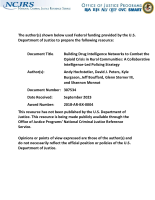Policing strategies
Exploring the Guardian Mindset as a Strategy for Improving Police-Community Relations
The Effects of Hot Spot Policing on Community Experiences and Perceptions in a Time of COVID-19 and Calls for Police Reform
Support Activities under Section 13(d) of Executive Order 14074: Workshops on Law Enforcement Use of Probabilistic DNA Technologies and Person-based Predictive Policing
Building Drug Intelligence Networks to Combat the Opioid Crisis in Rural Communities: A Collaborative Intelligence-Led Policing Strategy
We Met Them Where They Are, But Is It Enough? A Qualitative Examination Of A Co-Response Outreach Program Servicing Vulnerable Populations in Philadelphia
Gunshot Detection Technology Time Savings and Spatial Precision: An Exploratory Analysis in Kansas City
Driving Down Gun Violence, Part 2
Three LEADS Scholars serving in different law enforcement agencies and positions discuss their experiences with identifying and implementing evidence-based interventions to reduce gun violence. NIJ Senior Advisor Dr. Tamara Herold hosts this conversation with guests Police Chief Cecilia Ashe (Milford Delaware Police Department), Chief of Staff Lieutenant Matthew Barter (Manchester, NH Police Department), and Analytical Services Manager Mr. Jason Schiess (Durham, NC Police Department).
Driving Down Gun Violence, Part 1
Three LEADS Scholars serving in different law enforcement agencies and positions discuss their experiences with identifying and implementing evidence-based interventions to reduce gun violence. NIJ Senior Advisor Dr. Tamara Herold hosts this conversation with guests Police Chief Cecilia Ashe (Milford Delaware Police Department), Chief of Staff Lieutenant Matthew Barter (Manchester, NH Police Department), and Analytical Services Manager Mr. Jason Schiess (Durham, NC Police Department).
Police Activities and Community Views of Police in Crime Hot Spots
An exploratory network analysis of hot people and places
Adverse Childhood Experiences and Adolescent Gang Membership: Utilizing Latent Class Analysis to Understand the Relationship
Papers From the Harvard Executive Session on Policing and Public Safety (2008-2015)
Relations Between Criminal Investigation Strategy and Police Management
Modern Policing and the Control of Illegal Drugs: Testing New Strategies in Two American Cities
Debating the Evolution of American Policing: An Edited Transcript to Accompany 'The Evolving Strategy of Policing'
Evolving Strategy of Policing
Research in Brief: Community Policing Strategies to Prevent Violent Extremism
Promising Practices for Using Community Policing Strategies to Prevent Violent Extremism: How to Create and Implement a Community Outreach Program
Evaluating Impacts of the Philadelphia Police School Diversion Program: An Alternative to Arrest Policing Strategy
An Evaluation of Compstat's Effect on Crime: The Fort Worth Experience
Predictable Policing: Measuring the Crime Control Benefits of Hot Spots Policing at Bus Stops
Using Geographic Analysis To Direct DDACTS Operations in Rochester
NIJ FY22 Research and Evaluation on Policing
NIJ-Funded Research on Mass Shootings to Advance Evidence-Based Policy and Practice
Mass public shootings continue to threaten communities in the United States, yet research on this criminal phenomenon is limited. In this full thematic panel, renowned experts will present a series of research projects summarizing NIJ-funded research projects’ newest findings on public mass shootings. The discussion will focus on NIJ’s investment to address the phenomenon of mass shootings through innovative study approaches to advance our understanding of mass shootings and inform prevention efforts. The implications of this research to criminal justice will also be discussed.
See the YouTube Terms of Service and Google Privacy Policy





